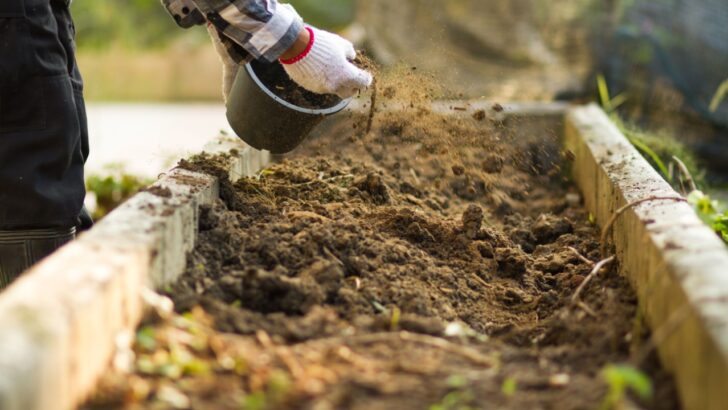If you feel strongly about eating your own home-grown, organic vegetables, and want to improve your garden soil, you need to learn how to make organic compost at home.
For most gardeners, the principle of simply growing your own vegetables using compost you make yourself would be entirely satisfying. But, if you are committed to making organic gardening compost, I encourage you to give it a try.
Why Make Organic Compost For Your Garden?
The whole point of composting waste in the garden is to turn organic material into nutrition for our plants, as well as to provide a well-structured soil for our vegetables to grow. Good news! You can improve your garden soil, including adding garden compost you made yourself, in many ways. Here are a few options:
- Burn the garden (do you need the fire department to stand by?)
- Add fertilizers (is it natural and organic?)
- Incorporate manure (but is it organic?)
- Add compost (should you buy it or make it?)
Burning releases certain nutrients that would otherwise be locked away in cells of vegetation. But composting is a less frantic way to release this valuable energy. There are two basic ways to compost:
- hot composting
- cold composting
How To Make Organic Compost At Home

- using organic seeds
- avoiding chemicals
- using organic compost/improvers
In order to make organic compost for your garden, you need to know where everything you add to your pile comes from. If you don’t know the origin of a food scrap, an eggshell, or a tea bag you’d like to add to your compost heap, you shouldn’t add it. Organic gardening is not easy, and neither is making organic compost. Some gardeners add these to their gardens, without knowing where they are coming from:
- Manure
- Kitchen scraps
- Eggshells
Manures are probably the first place we would turn if we needed to improve the soil nutrition and structure. But, as an organic vegetable gardener, should we use manure?
Strictly speaking, it’s likely we couldn’t use it because there’s more to “organic” than simply avoiding animal products and chemicals. In order to use manure, you’d need to know that the animals producing the manure were organically fed and were kept in stables that used only organic bedding. This care would prevent accidental exposure to non-organic materials and unwanted chemicals that could be absorbed and processed, transferring them to the animals’ waste products and, therefore, our food chain. Collecting manure from free-grazing animals might be a good option, but if these animals are treated with medicines during their lifetime, do those medicines comply with an organic system? It’s hard to tell.
- Some antibiotics and other drugs (like dewormers) are not compatible with organic growth.
- It is also quite common for farmers to use chemical herbicides to control certain unwanted plants. How do you know for sure that those chemicals aren’t entering your food chain?
How Can You Obtain Organic Manure?
Probably the best approach for securing organic manure would be to do so through an organic meat producer. Remember that their manure is valuable to their own farming, so don’t expect it for free. You can purchase bagged manure, such as steer manure and chicken manure, that is certified organic. It’s expensive, but a little goes a long way.
Getting Organic Compost
Municipal or council-produced compost might be an option for a home gardener. But it’s not necessarily good for an organic grower, as the waste that the council collects to make the compost is completely untraceable. Buying organic compost can be very expensive, but most lawn and garden stores have bags of organic compost for sale. Or you can make your own. Learning how to make organic compost is probably the best way to become an organic gardener.
It might be a long road, and in the end, you might decide that 100% organic is not that important. But as long as you get good, nutritious food you grew yourself, your family will thrive without spending a lot at the grocery store or the vegetable market. Making your own compost will give you control over your compost pile. Whether you make hot or cold compost, you will need to be careful of what you put in your compost bins or composter. No matter what you end up doing, I’m sure you’ll enjoy your garden and the food you harvest from it!



Best Compost To Buy For Vegetable Garden
Sunday 15th of May 2022
[…] However, if you’re looking to start growing your own vegetables at home, there are still certain things that you need in order to make sure you get a delicious crop of homegrown vegetables. Chief amongst these is good quality compost. […]
Trench Composting For Garden Success
Monday 7th of February 2022
[…] are some other methods of composting, as well as tips on building a wormery and creating organic compost. So, what are you waiting for? Get started […]
Topsoil Vs Compost - Which One Should You Use?
Tuesday 16th of March 2021
[…] Can be made for free (learn how to make organic compost) […]
How To Grow Cantaloupe In Containers - A Vertical Growing Guide
Tuesday 8th of December 2020
[…] always recommend organic fertilizer, especially when dealing with fruits and […]
How To Make Compost From Weeds
Wednesday 2nd of December 2020
[…] with waste as an organic way of gardening, but unless you follow some strict rules on producing organic compost, it can’t really be termed as […]